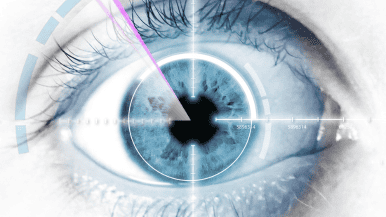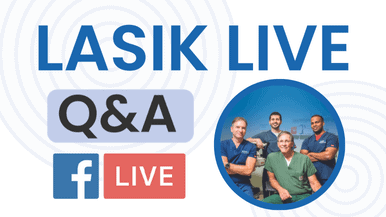- What is laser eye surgery?
- What is recovery like after laser vision surgery?
- At what age should you consider LASIK?
- Is LASIK right for you?
Generally, if you are between the ages of 18-55, you may be a candidate for laser eye surgery, commonly referred to as LASIK. With that said, your eye is typically healthiest and most resilient between the ages of 19 and 40.
Each year, more than 700,000 Americans receive laser vision surgery. It remains one of the most popular elective surgeries and is a both safe and effective way to improve your vision. However, while people of all ages can experience a decline in their vision, is laser eye surgery right for everyone?
What is Laser Eye Surgery?
LASIK, or laser in-situ keratomileusis, is a refractive surgical procedure to correct vision. People experiencing nearsightedness, farsightedness, or astigmatism, can eliminate the need for glasses or contact lenses from their lives with this simple surgery to reshape the cornea of the eye.
The eyes work when light passes through the lens of your eye to the cornea at the front of the eye. The cornea refracts, or bends the light into the retina at the back of the eye. The retina turns light into signals which are sent to your brain that become the images you see. When light is bent improperly (a refraction error), your vision is blurry. This is caused by a malfunction in the shape of your cornea or lens. This results in:
- Myopia, or nearsightedness, where objects that are far away are blurry
- Hyperopia, or farsightedness, where objects that are close are blurry
- Astigmatism, where near and far objects are blurry
Laser eye surgery typically uses a special kind of cutting laser to carefully reshape the cornea so the light bends properly. This can eliminate myopia, hyperopia, and astigmatism, allowing the patient to eliminate their reliance on contacts or glasses.
At Ocala Eye, our surgeons use the CustomVue LASIK procedure which employs a custom bladeless laser to reshape the eye. The technology allows a surgeon to correct vision based on individual and patient-specific refractive errors. The goal is for patients to enjoy the best vision possible with this more advanced procedure. CustomVue LASIK is state-of-the-art medicine that provides our patients with a highly precise, accurate way to correct their vision.
Thinking About Getting LASIK?
Watch the videos below to find out more.

LASIK surgery using a microkeratome blade has now been replaced by all-laser bladeless LASIK
What is Recovery Like After Laser Vision Surgery?
Complete recovery from the laser surgical procedure can take several months, although you will likely experience better vision almost immediately. Typically, a three-to-six-month window is required for the eyes to heal fully. Most patients are able to return to many of their normal activities within a few days.
It’s normal to experience some itching or burning in the first 24-hours. Resting your eyes for up to four hours and avoiding strenuous activity is important. Wear sunglasses to protect your eyes. Follow your doctor’s instructions carefully during this time as you heal.
The first month also has some restrictions to help prevent infection. For example, avoid swimming in any water that could be contaminated. Avoid eye makeup and eye creams for at least a week after the surgery. You can resume exercise after the first week or so but avoid anything too strenuous such as contact sports.
Given the individual nature of healing, most patients continue to heal under their doctor’s careful supervision for three to six months after the laser vision correction.
With CustomVue laser surgery, the procedure is less invasive when compared to surgeries that use a microkeratome blade in traditional LASIK. This can reduce some of the potential risks of the LASIK procedure. CustomVue uses ultraviolet light to remove tiny amounts of corneal tissue without penetrating the eye itself.
At What Age Should You Consider LASIK?
People of all ages struggle with vision issues, but the FDA suggests that laser vision correction is only for patients ages 18 and older.
The American Academy of Ophthalmology recommends patients wait until they are 21, simply because the eye is continuing its development during these formative years. But can you be too old to have laser corrective surgery?
The answer is no, but there are some caveats. After age 40, your eyes will begin to change. You may develop presbyopia, or aging-related farsightedness. Aging results in many people over the age of 45 adopting reading glasses as a normal part of their lives. After age 60, you are also more at risk for a number of eye diseases that could change how you see, including:
- Age-related macular degeneration (AMD) that affects how we see fine details
- Cataracts are cloudy areas in the lens of the eye
- Diabetic retinopathy is a side effect of diabetes
- Dry eyes
- Glaucoma causes the gradual loss of peripheral vision and damage to the optic nerve
- Retinal detachment is a tearing of the internal eye structure
The eyes change over the course of your lifetime. Laser vision correction does not account for the normal aging of the eyes. All of these conditions can cause the eye structure to change which means down the road you may need additional surgeries or eye correction with glasses or contacts. Typically, laser eye surgery can last a decade or longer, but there is no hard and fast rule; every person ages differently.
Is LASIK Right for You?
Having laser vision correction is an individual decision best made with a consultation between you and your doctor. Most people can benefit from LASIK surgery, but if you are pregnant or nursing, taking certain prescription drugs, or even if your glasses or contact lens prescription has changed in the last year, you might not be a candidate at this time.
Generally, you should be in good health to consider this type of vision correction. Again, each patient is different so it’s a good idea to schedule a visit with Ocala Eye if you’re considering laser eye surgery.





